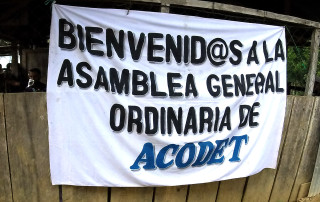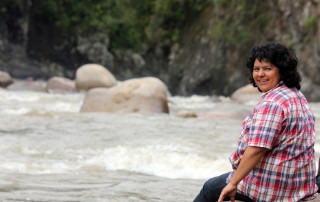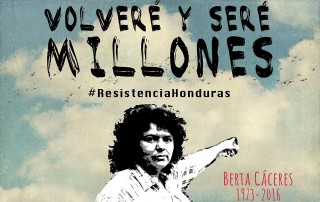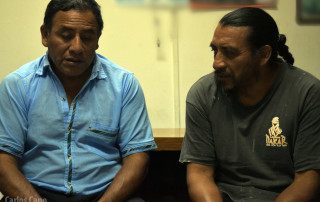Sepur Zarco
On February 26, 2016, indigenous women from the community of Sepur Zarco made history when they and their legal team successfully prosecuted former Guatemalan military officials for sexual and domestic slavery. Based largely on the testimonies of 15 Q’eqchi’ survivors, a Guatemalan tribunal convicted two men—former Military Commissioner Heriberto Valdez Asig and former Colonel Esteelmer Francisco Reyes Girón—of crimes against humanity for sexual and domestic slavery carried out at a military recreation center in the 1980s.
While the defendants faced charges for other crimes committed in the same context, including the forced disappearance of several of the women’s husbands, the trial holds national significance as the first transitional justice case in Guatemala to firmly center the experiences and impacts of sexual and domestic violence against women during the internal armed conflict.
When I became strong enough to be able to say what I had to say, I told the whole truth. That was what gave me strength…The moment came that we had been waiting for, for so long – to see justice.
In-depth NISGUA reports

Q’eqchi’ women set a precedent in Guatemala with first-ever conviction for sexual and domestic slavery.

Report-back from the “Guatemalan Women Healing Towards Justice” tour, featuring Maudi Tzay from the Alliance to Break Silence and Impunity.
In the early 1980s, communities in the Polochic Valley in Guatemala challenged wealthy landowners for legal titles to their ancestral lands. Around the same time, Guatemalan dictatorships constructed several military bases around the region of Sepur Zarco with the support of the U.S. The base built in Sepur Zarco was designated a military recreation center, where troops would return after taking 15-day rotations patrolling the surrounding mountains.
The soldiers at the Sepur Zarco military base disappeared men from the community who were seeking land titles, demonstrating the powerful connections between wealthy elites and the military. The women that survived them were then forced into sexual and domestic slavery for years. The trial illustrated how patriarchy and racism play out on women’s bodies in war. Grounded in the recognition that these systems endure today in Guatemala and the world over, the women survivors prosecuted this case as part of a multi-faceted strategy for social change. To do so they worked with a coalition of feminist, legal, and psychosocial organizations known as the Alliance to Break Silence and End Impunity.

Photo: CPR Urbana
The intergenerational struggle for access to and protection of land
After the verdict, the courts ordered 18 reparations to redress the physical, psychological, and material impacts of the violence. These include increased access to healthcare and education for survivors and community members, and legal reforms to reduce the barriers against survivors of sexual violence. The reparations focused on repairing harm, dissuading future violence, and community healing.
Survivors repeatedly testified to the psychological and economic impact of their husbands’ disappearances and how a lack of land access has perpetuated poverty. To carry out court ordered reparations, the Guatemalan national land registry must grant land titles and prioritize families of those forcibly disappeared while in the process of registering their land. Nonetheless, almost three years after the sentence, survivors have yet to receive titling.

In Solidarity
The Alliance to End Silence and Impunity called upon the international community to stand in solidarity with the women survivors of Sepur Zarco to ensure the legal system respects the sentence. The Alliance made direct requests for accompaniment, reporting, and advocacy to broaden the social impact of the case on a global scale.
Members of NISGUA responded to this call by gathering together to educate themselves and express solidarity with the survivors. We strengthened movements in Guatemala and the U.S. by drawing direct connections with local feminist struggles for gender justice and indigenous solidarity.
Latest from our blog
ACODET reaffirms peaceful resistance to the Xalalá Dam amid threats to environmental activists
Let us wake up! Let us wake up, humankind! We’re out of time. We must shake our conscience free of the rapacious capitalism, racism, and patriarchy that will only assure our own self-destruction. The [...]
Open Letter to U.S. Secretary of State John Kerry Regarding Murder of Honduran Indigenous and Environmental Activist Berta Cáceres
March 10, 2016 Dear Secretary of State Kerry, We write in shock and deep sorrow regarding the murder of Honduran human rights and environmental defender Berta Cáceres, founder and general secretary of the Civic [...]
Civil society organisations in America and Europe condemn the murder of Berta Cáceres, Lenca indigenous leader and human rights defender
March 4, 2016. The signatory networks and organisations who support the defence of human rights in Honduras, condemn the murder of Lenca indigenous leader Berta Cáceres, coordinator of the Civic Council of Grassroots and [...]
Organizaciones de las sociedades civiles de América y Europa condenamos el asesinato de la lideresa indígena del pueblo Lenca y defensora de los Derechos Humanos, Berta Cáceres
4 de marzo de 2016. Las redes y organizaciones firmantes, que apoyamos la defensa de los Derechos Humanos en Honduras, repudiamos el asesinato de la lideresa indígena Lenca, Berta Cáceres, coordinadora del Consejo Cívico [...]
Judge sends to trial the case against Rigoberto Juárez and Domingo Baltazar
Original article written in Spanish by Nelton Rivera for Prensa Comunitaria. Read the original article here. Translation by NISGUA. By Nelton Rivera “We will continue to defend life. We will give our lives if necessary, [...]
Sepur Zarco guilty verdict takes major step forward in global fight for gender justice
Yesterday marked an historic day for both Guatemala and the world in the struggle to seek justice for gender-based crimes. Retired Coronel Esteelmer Reyes Girón and former Military Commissioner Heriberto Valdez Asig were convicted [...]














